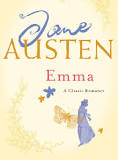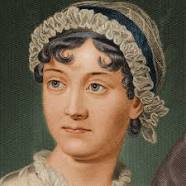Emma Page #19
Emma, by Jane Austen, is a novel about youthful hubris and the perils of misconstrued romance. The story takes place in the fictional village of Highbury and the surrounding estates of Hartfield, Randalls, and Donwell Abbey and involves the relationships among individuals in those locations consisting of "3 or 4 families in a country village". The novel was first published in December 1815 while the author was alive, with its title page listing a publication date of 1816. As in her other novels, Austen explores the concerns and difficulties of genteel women living in Georgian–Regency England; she also creates a lively comedy of manners among her characters and depicts issues of marriage, gender, age, and social status.
May its approval beam in that soft eye! Harriet exactly. Soft is the very word for her eye--of all epithets, the justest that could be given. Thy ready wit the word will soon supply. Humph--Harriet's ready wit! All the better. A man must be very much in love, indeed, to describe her so. Ah! Mr. Knightley, I wish you had the benefit of this; I think this would convince you. For once in your life you would be obliged to own yourself mistaken. An excellent charade indeed! and very much to the purpose. Things must come to a crisis soon now.” She was obliged to break off from these very pleasant observations, which were otherwise of a sort to run into great length, by the eagerness of Harriet's wondering questions. “What can it be, Miss Woodhouse?--what can it be? I have not an idea--I cannot guess it in the least. What can it possibly be? Do try to find it out, Miss Woodhouse. Do help me. I never saw any thing so hard. Is it kingdom? I wonder who the friend was--and who could be the young lady. Do you think it is a good one? Can it be woman? And woman, lovely woman, reigns alone. Can it be Neptune? Behold him there, the monarch of the seas! Or a trident? or a mermaid? or a shark? Oh, no! shark is only one syllable. It must be very clever, or he would not have brought it. Oh! Miss Woodhouse, do you think we shall ever find it out?” “Mermaids and sharks! Nonsense! My dear Harriet, what are you thinking of? Where would be the use of his bringing us a charade made by a friend upon a mermaid or a shark? Give me the paper and listen. For Miss ------, read Miss Smith. My first displays the wealth and pomp of kings, Lords of the earth! their luxury and ease. That is court. Another view of man, my second brings; Behold him there, the monarch of the seas! That is ship;--plain as it can be.--Now for the cream. But ah! united, (courtship, you know,) what reverse we have! Man's boasted power and freedom, all are flown. Lord of the earth and sea, he bends a slave, And woman, lovely woman, reigns alone. A very proper compliment!--and then follows the application, which I think, my dear Harriet, you cannot find much difficulty in comprehending. Read it in comfort to yourself. There can be no doubt of its being written for you and to you.” Harriet could not long resist so delightful a persuasion. She read the concluding lines, and was all flutter and happiness. She could not speak. But she was not wanted to speak. It was enough for her to feel. Emma spoke for her. “There is so pointed, and so particular a meaning in this compliment,” said she, “that I cannot have a doubt as to Mr. Elton's intentions. You are his object--and you will soon receive the completest proof of it. I thought it must be so. I thought I could not be so deceived; but now, it is clear; the state of his mind is as clear and decided, as my wishes on the subject have been ever since I knew you. Yes, Harriet, just so long have I been wanting the very circumstance to happen that has happened. I could never tell whether an attachment between you and Mr. Elton were most desirable or most natural. Its probability and its eligibility have really so equalled each other! I am very happy. I congratulate you, my dear Harriet, with all my heart. This is an attachment which a woman may well feel pride in creating. This is a connexion which offers nothing but good. It will give you every thing that you want--consideration, independence, a proper home--it will fix you in the centre of all your real friends, close to Hartfield and to me, and confirm our intimacy for ever. This, Harriet, is an alliance which can never raise a blush in either of us.” “Dear Miss Woodhouse!”--and “Dear Miss Woodhouse,” was all that Harriet, with many tender embraces could articulate at first; but when they did arrive at something more like conversation, it was sufficiently clear to her friend that she saw, felt, anticipated, and remembered just as she ought. Mr. Elton's superiority had very ample acknowledgment. “Whatever you say is always right,” cried Harriet, “and therefore I suppose, and believe, and hope it must be so; but otherwise I could not have imagined it. It is so much beyond any thing I deserve. Mr. Elton, who might marry any body! There cannot be two opinions about him. He is so very superior. Only think of those sweet verses--'To Miss ------.' Dear me, how clever!--Could it really be meant for me?” “I cannot make a question, or listen to a question about that. It is a certainty. Receive it on my judgment. It is a sort of prologue to the play, a motto to the chapter; and will be soon followed by matter-of-fact prose.” “It is a sort of thing which nobody could have expected. I am sure, a month ago, I had no more idea myself!--The strangest things do take place!” “When Miss Smiths and Mr. Eltons get acquainted--they do indeed--and really it is strange; it is out of the common course that what is so evidently, so palpably desirable--what courts the pre-arrangement of other people, should so immediately shape itself into the proper form. You and Mr. Elton are by situation called together; you belong to one another by every circumstance of your respective homes. Your marrying will be equal to the match at Randalls. There does seem to be a something in the air of Hartfield which gives love exactly the right direction, and sends it into the very channel where it ought to flow. The course of true love never did run smooth-- A Hartfield edition of Shakespeare would have a long note on that passage.” “That Mr. Elton should really be in love with me,--me, of all people, who did not know him, to speak to him, at Michaelmas! And he, the very handsomest man that ever was, and a man that every body looks up to, quite like Mr. Knightley! His company so sought after, that every body says he need not eat a single meal by himself if he does not chuse it; that he has more invitations than there are days in the week. And so excellent in the Church! Miss Nash has put down all the texts he has ever preached from since he came to Highbury. Dear me! When I look back to the first time I saw him! How little did I think!--The two Abbots and I ran into the front room and peeped through the blind when we heard he was going by, and Miss Nash came and scolded us away, and staid to look through herself; however, she called me back presently, and let me look too, which was very good-natured. And how beautiful we thought he looked! He was arm-in-arm with Mr. Cole.” “This is an alliance which, whoever--whatever your friends may be, must be agreeable to them, provided at least they have common sense; and we are not to be addressing our conduct to fools. If they are anxious to see you happily married, here is a man whose amiable character gives every assurance of it;--if they wish to have you settled in the same country and circle which they have chosen to place you in, here it will be accomplished; and if their only object is that you should, in the common phrase, be well married, here is the comfortable fortune, the respectable establishment, the rise in the world which must satisfy them.”
Translation
Translate and read this book in other languages:
Select another language:
- - Select -
- 简体中文 (Chinese - Simplified)
- 繁體中文 (Chinese - Traditional)
- Español (Spanish)
- Esperanto (Esperanto)
- 日本語 (Japanese)
- Português (Portuguese)
- Deutsch (German)
- العربية (Arabic)
- Français (French)
- Русский (Russian)
- ಕನ್ನಡ (Kannada)
- 한국어 (Korean)
- עברית (Hebrew)
- Gaeilge (Irish)
- Українська (Ukrainian)
- اردو (Urdu)
- Magyar (Hungarian)
- मानक हिन्दी (Hindi)
- Indonesia (Indonesian)
- Italiano (Italian)
- தமிழ் (Tamil)
- Türkçe (Turkish)
- తెలుగు (Telugu)
- ภาษาไทย (Thai)
- Tiếng Việt (Vietnamese)
- Čeština (Czech)
- Polski (Polish)
- Bahasa Indonesia (Indonesian)
- Românește (Romanian)
- Nederlands (Dutch)
- Ελληνικά (Greek)
- Latinum (Latin)
- Svenska (Swedish)
- Dansk (Danish)
- Suomi (Finnish)
- فارسی (Persian)
- ייִדיש (Yiddish)
- հայերեն (Armenian)
- Norsk (Norwegian)
- English (English)
Citation
Use the citation below to add this book to your bibliography:
Style:MLAChicagoAPA
"Emma Books." Literature.com. STANDS4 LLC, 2024. Web. 28 Dec. 2024. <https://www.literature.com/book/emma_29>.




Discuss this Emma book with the community:
Report Comment
We're doing our best to make sure our content is useful, accurate and safe.
If by any chance you spot an inappropriate comment while navigating through our website please use this form to let us know, and we'll take care of it shortly.
Attachment
You need to be logged in to favorite.
Log In